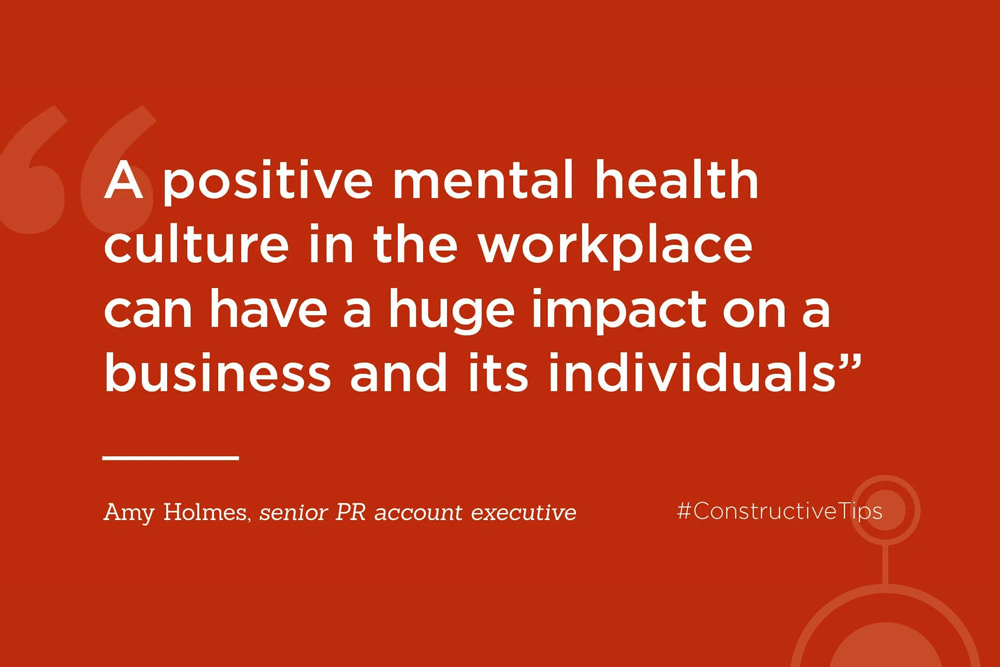Creating a positive mental health culture at work
Published - 12th January 2022

With the festive period over and so-called ‘Blue Monday’ fast approaching, you’re probably seeing plenty of advice on how to take care of your wellbeing.
While it’s great to see this kind of information being shared widely at the moment, it’s vital that this becomes a year-round conversation. This is important not just online and at home, but also in the workplace. And it’s particularly important in the construction industry, with suicide the leading cause of death for men under the age of 50 – a group representing a large part of the industry’s workforce.
Here at Harris, we’re lucky to have an open culture where we genuinely care about each other’s wellbeing. From our Real Living Wage accreditation and flexible working policy to our summer wellbeing day and regular stress surveys, creating a positive mental health culture has always been a priority at Harris – it’s one of the reasons I joined, and I know it’s one of the reasons we all stay here. This company-wide emphasis on wellbeing was further solidified recently, when I was encouraged to gain a mental health first aider qualification to help us continue to build on our culture of wellbeing.
A positive mental health culture in the workplace can have a huge impact on a business and its individuals. Here are some simple steps that can be taken to prioritise employee wellbeing.
Assign a mental health first aider
While businesses are required to assign someone to oversee first aid requirements in the workplace, the same can’t currently be said for mental health first aid. But just because it’s not a legal requirement doesn’t mean it’s not important, and fortunately more and more businesses are seeing the benefits of assigning a mental health first aider, or several, depending on the size of the organisation.
Not only are mental health first aiders trained to deal with crises should they arise, but they can also keep an eye out for any signs of reduced mental wellbeing among colleagues and encourage early intervention, which is proven to aid recovery. Mental health first aiders can also raise awareness of mental health-related issues, which breaks down stigma and encourages communication.
Create an open culture
An assigned mental health first aider is a great way to create a more open culture in the workplace when it comes to mental health, but there are several other steps businesses can take to achieve this.
Speaking openly about what the business is doing for the wellbeing of its employees – as it would talk about what it’s doing to become more environmentally friendly, for example – is an easy way to create an inclusive culture where people feel comfortable talking about the issues they’re facing.
According to the Mental Health Foundation, almost 13 per cent of UK sick days are related to mental health, and providing better support for mental health at work can save UK businesses up to £8 billion per year. Publicising commitments to mental health in the workplace and fundraising for mental health charities are examples of how businesses can create a more open culture, which helps both the business and its people alike.
Show employees that they’re valued
Never underestimate the effect of showing employees that they’re valued, and the positive impact this can have on their wellbeing.
There are several ways businesses can demonstrate how much they value their team, from committing to paying staff a living wage and including them in business decisions where appropriate, to giving time off in lieu and something as simple as praising people for good work. Here at Harris, we take this to the next level with the annual Harris Awards, celebrating the great things each person brings to the team. And of course we can’t forget our beloved Christmas Dinner Doner Day tradition!
However you choose to show appreciation for your team, it will not only improve mental health and wellbeing in the workplace, but it can also have a positive effect on the business such as increased productivity and reduced staff turnover.
Creating a wellbeing-focused culture in the workplace isn’t something that’s going to happen overnight, but a genuine commitment to making positive changes is a great way to start. Make use of online resources, listen to your team’s experiences, and show them that you’re taking mental health in the workplace seriously.
Harris »